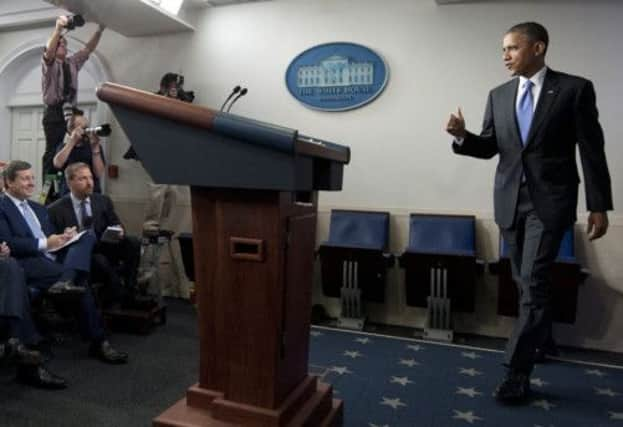Leaders: America fails to pull back far enough


The compromise is wholly welcome given the horrific consequences of a US government shutdown and debt default. This would have triggered financial trauma world-wide.
America has pulled back from an awesome brink. The Republican Party, and in particular its Tea Party element, has suffered a major reverse. President Obama said yesterday that there were no winners in this stand-off. But the losers are far from confined to the Republicans.
Advertisement
Hide AdAdvertisement
Hide AdRelief is set to prove short-lived. This is not a resolution but a postponement, not an ending but a continuation. America’s deeply divided politics and the tottering pile of debt at its centre both continue for now.
The deal re-opens the government only until 15 January. It suspends the debt ceiling only until 7 February. And it requires talks to reach agreement on measures to reduce the budget deficit by 13 December. Far from the Republican Party hardliners nursing their gaping wounds inflicted in Washington and walking away from the battle, they are as likely to take the opposite view, believing more, not less, pressure is needed to pull the US Congress and the Washington liberal establishment from its errant ways.
What brings this problem to our own shore is that this battle is being fought at the heart of the world’s biggest economy, whose currency is the mainstay of the global financial system. As if the damage already inflicted on a domestic economy still struggling to hit a credible recovery pace was not enough, the prospect of further protracted brinkmanship risks serious blows both to domestic confidence and to overseas holders of America’s debt.
Little wonder some see in this not some passing political crisis but disturbing evidence of the decline of America’s global power. That is why the administration’s opponents stand accused of playing a highly dangerous game that could result in a humiliating credit rating downgrade, a sell-off by debt holders and a collapse in the dollar. But they in turn can point to a succession of US administrations that have failed to impose discipline on the nation’s finances and argue that Congress has irresponsibly allowed America’s debt to climb to a record and altogether unsustainable level. This nettle has to be grasped, they argue, and the sooner the better.
President Obama says America “will bounce back”. But can it do so while this wrangle persists? The Federal Reserve cannot with confidence act on its pledge to embark on the withdrawal of monetary easing, dealing a blow to its own credibility while adding to market uncertainty. Barring some Damascene conversion on either side, it is hard to see how this crisis is going to be resolved any time soon. And for that, we will all pay a price.
Cool heads needed at Grangemouth
What initially seemed to be good news of strike action averted at the giant Ineos refinery complex at Grangemouth is turning into an altogether more disturbing affair. The company says it is “financially distressed” and is seeking staff agreement as early as Monday on a range of pay and pensions proposals. A dispute over the trade union activities of an employee has morphed into a stand-off with the Unite union at battle stations and the future of the plant at stake.
Until the staff signal agreement to the company’s proposals, the plant remains shut down. Unite has accused the company of a gigantic game of bluff in which the future of fuel supplies across Scotland are put at risk. Listening to the reactions of both sides, it is hard to dispel a depressing sense of Grangemouth caught in an industrial relations time warp, with all the intransigent rhetoric of the 1970s.
Much now rests on the intervention of First Minister Alex Salmond to defuse the situation and create space for more reasoned dialogue between management and staff. Such are the times we are in, many companies have had to introduce changes to their pension schemes and freeze pay rises. Ineos is no different. But it needs to couch its proposals in a manner more likely to secure acceptance. Setting strict deadlines of “comply or else” is unlikely to achieve this and, if anything, encourages a negative response.
Advertisement
Hide AdAdvertisement
Hide AdToo much is at stake for the Scottish administration to stand aloof. Mr Salmond’s pleas for a move to constructive negotiations leading to the resumption of plant operations and an altogether more secure future at Grangemouth merit an early and positive response.